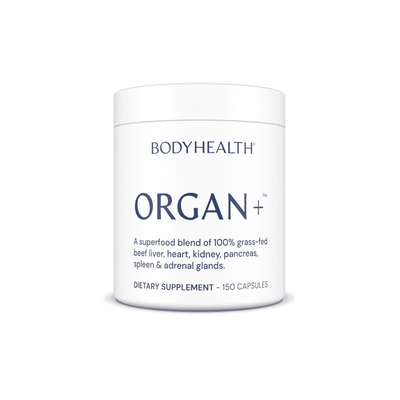Hormones: The Third Dimension Of Calorie Counting
December 30, 2025 5 min read

Ask anyone about bulking and cutting and they’ll bring up calories and macronutrients.
“You have to count your calories and macronutrients and make sure that you eat more than you need to build muscle (and body fat) and eat less than you need to burn fat.”
And that’s true… to a degree. But there’s more to it, and if you just follow the above, you’ll more than likely miss your goals.
Before we jump in, let’s make sure we’re clear on what calories and macronutrients are.
Calories are basically a measurement of how much potential energy is in a food. “Potential” because some of it will actually be used as energy… and some will not.
This can be energy which is “burned” right now for physical activity — sugars or fatty acids. Or it can be energy stored for later use — body fat and glycogen (stored sugars).
And Macronutrients (or Macros)are the foods needed in large amounts for your body to operate: Proteins, Fats, and Carbohydrates. Each one of these has a different calorie potential.
So we look at what we’re trying to achieve (build muscle or lose fat) and decide how many calories we need to eat and what percentage of calories should come from which “macro” group.
From this we measure how many calories of which macro are in different foods and now we know how much of what to eat each day.
That’s calorie and macro counting in a nutshell.
But there’s a lot of talk on these subjects of macros and calorie counting.
Some people say counting calories is the only thing that works.
Others say calories have nothing to do with it at all.
Then some people say it’s the ratio of the three macronutrients that’s important, with different experts stating different ratios, some quite far apart.
But what is it? Does calorie counting work or not? And which ratio of proteins, fats, and carbs is best?
The truth is, there isn’t an absolute yes or no to the above question, or even an exact optimum percentage of those three macronutrients.
Not because it doesn’t work — it does.
But if the only thing we do is count calories and divide them between proteins, fats, and carbs, it’s too general.
Way too general.
It’s two dimensional. We need to enter the third dimension on this. Or fourth or fifth.
Yes, we need to measure the amount of calories to make sure we get enough energy and not too much. And we need to make sure we get enough protein, fat and carbohydrates so we can build muscle or have energy to power us through the day.
But… which proteins, fats, and carbs? And how do they affect the hormones that will determine how they’re used?
Because hormones fully determine how these macronutrients will be used.
Will these carbs and fats be turned into body fat? Or used as energy? Or will they become part of the structure of the body?
It’s our hormones that decide.
Will this protein be used to build muscle? Or will it be turned into sugar or body fat?
Hormones decide.
It’s not how much you eat that decides. It’s which exact food you eat and how that exact food affects your hormones.
We can say that carbs raise insulin levels. And that too many carbs, plus insulin, raises fat storage.
True.
But which carbs?
Are we eating a couple of apples or drinking a Coke? Each have the same amounts of carbs and yet each will produce a very different reaction in our body, both hormonally and in how they’re used by our body.
A Coke will spike insulin almost immediately and goes in too fast for most bodies to even use as energy, largely triggering fat creation.
It will also raise cortisol levels, another hormone that increases fat and breaks down muscle.
But a couple of apples will hit much more slowly, raising insulin levels slowly, but also producing less insulin overall.
They’re also good for lowering cortisol levels.
And, the body will use them for energy when you consume them, with a lower likelihood of them being converted to fat.
See the difference?
Being too general and just saying more or less “calories” leads to differing results because of how the foods we eat affect our hormones and are used.
We need to get more specific. Not in a way that’s utterly complex and no one could ever follow. But in a way that can be followed, yet is effective.
We run into the same situations with proteins and fats. Some fats help us lose body fat and balance our hormones, while others cause us to gain body fat.
Some proteins are well utilized as protein in the body, and others are poorly utilized, mostly being converted to sugar or body fat.
We can say that proteins are 4 calories per gram. But that’s not how the body uses them.
Whole eggs are 48% used to build new protein in the body and only 52% converted to calories.
But whey is only 18% utilized to build new protein and 82% converted to calories.
So we can't just say we had 30 grams of protein.
No. 30 grams of which protein?
Does that make sense? Do you see why we can’t just divide it into carbs, fats, and proteins and call it a day?
It’s not just a matter of how much of each to consume, but which type of each.
In the Lean Bulk/Lean Body Guide we break all of this down. Not so much that you get completely lost, but enough so you get a real understanding of how this works, and can apply it to yourself.
And don’t worry, we’ll bring it back down to a usable simplicity in the protocol.
But we can only do that if you understand each part.
Go here to start the Lean Body/Lean Bulk Protocol & 30-Day Challenge.
Or, if you want to lose excess body fat, check out our Guide to Sustainable Fat Loss, it's very effective.
We're going to have so much fun!
And if you have any questions, make sure to join our BodyHealth Community where you can ask any question you have and get only the best answers.
Index To The Lean Body/Lean Bulk Guide:
Introductory Articles:
Getting Started:
- The Lean Body/Lean Bulk Guide & 30-Day Challenge
- Hormones: The Third Dimension of Calorie Cutting
- The Lean Body/Lean Bulk Diet
Supplements & Macros By Goal:
- Supplements & Macros For Lean Body
- Supplements & Macros For Beginner To Moderate Lean Bulking
- Supplements & Macros For Advanced Lean Bulking
Workout Regimens & Exercise Videos:
- Beginner to Moderate Level Workout Regimen
- Advanced Workout Regimen
- Lean Body/Lean Bulk Exercise Videos
Week One:
- Metrics & Key Data For Week One
- How BCAAs Build Body Fat & Lower Health Over Time
- The Importance Of Complete Protein Digestion
Week Two:
- Dialing In Our Macros For Lean Muscle: Hormones & Cravings
- How Cortisol Breaks Down Muscle & Prevents Protein Synthesis
- How To Improve Growth Hormone, Testosterone & Protein Synthesis
Week Three:
- Thyroid, Estrogen & Progesterone: Speeding Fat Loss & Lean Muscle Creation
- Improving Sleep: Muscle Building, Fat Loss, Mood & Aging
- Maximizing Cellular Function For Endurance & Recovery
Week Four:
- Raising VO2 Max: Endurance, Performance & Recovery
- How Toxins Affect Our Hormones: Building Muscle & Fat Loss
- Blood Flow For Muscle, Fat Loss & Overall Health
Final Week:
Articles by Health Topic
Your Path To Better Health Starts Here!
From in-depth articles on nutritional benefits to updates on new product launches, stay informed and inspired on your journey to optimal health.
*These statements have not been evaluated by the Food and Drug Administration. These products are not intended to diagnose, treat, cure, or prevent any disease.











